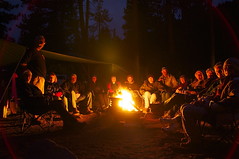Following the assignment to create a group post/video we came up with the following video. (Turn your speakers all the way up, we are amateur movie makers!)
The most striking similarity in these two types of knowledge comes from their interactive nature. Meaning two people have to actually interact with one another in order for the knowledge to pass from one person to another. All of our writing and print knowledge gives us a disconnect between author and reader. You are experiencing this right now as you read the words I am writing, days, weeks, or years later. Do you know me? Does it matter? Probably not too much, but how would our experience differ if I told this to you personally, instead of you reading some strangers’ blog?
Now we would just like to put in a few words more on the topic of Story and Song. In the video we talked about each other's civilizations and how they all relate through the theme of water in their origin myths, and stories in general. Maddie shared a little bit more on this theme here. What we didn't get to is how this important oral knowledge is shared, or the structures for sharing it.
Communicating Oral Knowledge:
Throughout the civilizations that our group has studied (Rome, Akkadia, Navajo and Samaria), we have found that stories were shared with groups of people and mainly one storyteller. We discussed that it was mainly the older generation that shared the tales.
Because we’ve now covered two units, folk and oral knowledge, we can begin to take a look at the differences that arise from communicating, or passing, knowledge in different forms. (We’ll certainly have more to say on this later!)
In our group we’ve come the conclusion that, at least as far as story and song are concerned, folk knowledge finds a niche in the greater category of oral knowledge. Clearly both folk and oral knowledge pass down generations through the basic medium of the spoken word, but oral knowledge has a more communal interaction element to it, as opposed to the individual interaction element from folk knowledge.
The main difference that separates strictly oral knowledge from folk knowledge comes from the question of why do we have oral knowledge. The stories, songs, and poems that get passed down often originate as explanations for various phenomena in the world around us. Most often these phenomena also have religious explanations, so in a way, oral knowledge is a type of religion. Maddie had more to say on this topic in her post, “Myths make the world go Around”.
Communicating Oral Knowledge:
Throughout the civilizations that our group has studied (Rome, Akkadia, Navajo and Samaria), we have found that stories were shared with groups of people and mainly one storyteller. We discussed that it was mainly the older generation that shared the tales.
As Kim said in her post, there were probably places where people met to hear knowledge from the master. The place could be an outdoor arena like the Synagogues from Samaria, around a ceremonial fire, inside a temple as in Akkadia or in a Colosseum. Each location would be specially chosen so as to not distract the listeners, but to make it possible for them all to hear and maybe set a scene. Erin also talked about having a specific narrator in her post on the Navajo .
Because we’ve now covered two units, folk and oral knowledge, we can begin to take a look at the differences that arise from communicating, or passing, knowledge in different forms. (We’ll certainly have more to say on this later!)
In our group we’ve come the conclusion that, at least as far as story and song are concerned, folk knowledge finds a niche in the greater category of oral knowledge. Clearly both folk and oral knowledge pass down generations through the basic medium of the spoken word, but oral knowledge has a more communal interaction element to it, as opposed to the individual interaction element from folk knowledge.
The main difference that separates strictly oral knowledge from folk knowledge comes from the question of why do we have oral knowledge. The stories, songs, and poems that get passed down often originate as explanations for various phenomena in the world around us. Most often these phenomena also have religious explanations, so in a way, oral knowledge is a type of religion. Maddie had more to say on this topic in her post, “Myths make the world go Around”.
The most striking similarity in these two types of knowledge comes from their interactive nature. Meaning two people have to actually interact with one another in order for the knowledge to pass from one person to another. All of our writing and print knowledge gives us a disconnect between author and reader. You are experiencing this right now as you read the words I am writing, days, weeks, or years later. Do you know me? Does it matter? Probably not too much, but how would our experience differ if I told this to you personally, instead of you reading some strangers’ blog?
So as we share our knowledge with you, in the video above and text below, what are you missing out on? What are we, as dispensers of knowledge, missing out on? Do you need a torch and pitchfork for your local library, or will you settle for just not knowing the answer to your high school english teacher when she said, “and what did the author mean by this”? (You know you wanted to answer that you don’t know, we should go ask the old dead guy that wrote it!)

No comments:
Post a Comment